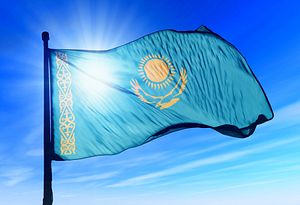If there’s one thing as depressingly predictable as the fact that Kazakhstan’s parliamentary elections earlier this week were far from free or fair, it’s that Astana would manage to find a handful of Westerners willing to besmirch their reputations to praise the vote. As we’ve seen with multiple rounds of so-called “zombie monitors” in the past — and as we’ve seen in other post-Soviet autocracies, most notably in Azerbaijan — Astana managed to cobble together a grip of putative experts to rubberstamp an election that saw neither veritable opposition nor the candidacy of jailed political prisoners. Just as Kazakhstan’s new parliament will mirror the parliament prior, a handful of monitors were willing to mirror Astana’s rhetoric, regardless of the facts on the ground.
At the risk of stating the obvious, the OSCE found Sunday’s vote severely lacking, continuing the pattern of Kazakhstan’s prior elections. Despite certain areas of progress, the “ruling party had a clear advantage over others in these elections,” OSCE Special Coordinator Marietta Tidei said. “And while the parties were generally able to campaign freely, genuine political choice remains insufficient.” Again, none of these findings are necessarily surprising; few, if any, expected Astana to break with prior tradition of preordained election results, or to offer anything but stifling restrictions on both media coverage and political pluralism.
Nonetheless, a handful of Westerners managed to buck the OSCE’s findings, and lend their names to buffing Kazakhstan’s image for audiences both domestic and international. Indeed, some of the names Astana featured are veterans of whitewashing Kazakhstani elections. For instance, a trio of Western analysts — Vladimir Socor, Richard Weitz, and Daniel Witt — penned a piece in the pro-government Astana Times discussing how Sunday’s vote “will provide opportunities for new generations of leaders to carry Kazakhstan forward toward a multi-party political system with strong democratic institutions.” Who these leaders are, the analysts didn’t say. But, as they continue, Kazakhstan can at least boast “[s]trong media freedoms” to “invigorate the anti-corruption campaign” Astana claims to be pushing. (Socor, Weitz, and Witt appear to have missed Astana’s recent efforts, via the U.S. court system, to demolish the country’s decimated independent media.)
If those names appear familiar, it’s because this crew has made a habit of pushing the Kazakhstani government’s interests for years. Both Socor and Witt have praised Kazakhstani elections for at least the better part of a decade, while Weitz was caught in an academic scandal a few years ago, willing to take funds from Astana for pushing pro-government, and putatively independent, reports.
Another Western analyst, Jacob Zenn, noted that the election — again, without any notable opposition members remaining, and with a recession looming — apparently illustrated continued support for Astana’s plotted path forward. Zenn’s rhetoric parallels his public declamations following the 2015 election. When President Nursultan Nazarbayev took 98 percent of the country’s vote last year, Zenn said that Kazakhstan, in comparison to “what it was twenty years ago,” has made apparent “progress in building democratic institutions.”
A small coterie of additional Western voices also plumped for Kazakhstan’s vote; their views are collated, conveniently, by the Astana Times. Former Italian Senator Franco Panizza, former Bulgarian official Desislava Terzieva, and Serbian official Dragomir Karić — who once said Kazakhstani elections exceeded European votes — heaped praise on last Sunday’s ballot. Austria’s Walter Schwimmer, the former secretary general of the Council of Europe — who had previously praised Astana’s “stability,” and who has called for cooperation between the EU and the Moscow-led Eurasian Union — also claimed democratic progress in Kazakhstan. And a pair of British nationals, Alan Spence, and James Lewis, further staked that they saw “no cases of infringements during the voting[.]” (“Everything is going well,” Spence offered, without any apparent irony.) Neither Spence nor Lewis carried any organizational affiliation — their nationality seemed their only qualification — but an Alan Spence had previously spoken at at least one Kazakhstani-funded event.
Of course, in addition to the Western observers, predictable praise arose from representatives of both the Shanghai Cooperation Organization and Commonwealth of Independent States, who’ve yet to see a farcical, autocratic election they wouldn’t applaud. But the fact that Astana managed to find Westerners willing to offer their reputations to echo the SCO and CIS representatives speaks, if nothing else, to the Kazakhstani government’s willingness to continue massaging its reputation for Western audiences.
Following this election, Kazakhstan’s parliament will remain nearly identical to that prior. And just like elections in the past, Astana’s playbook of finding certain Western voices to spin the election remains identical, too.
































